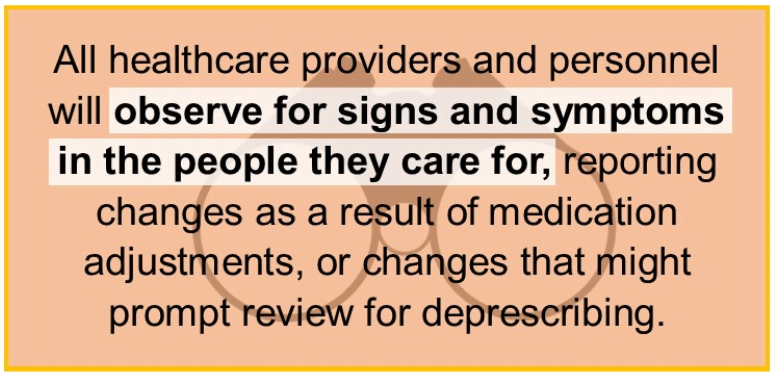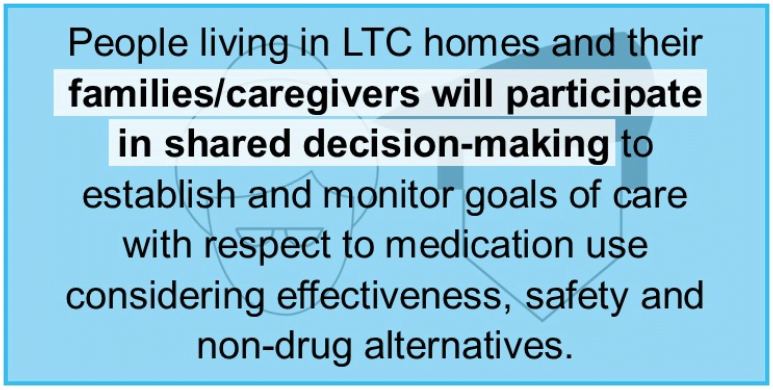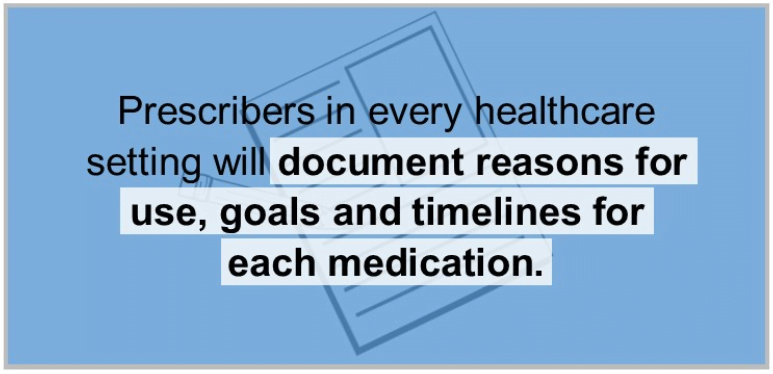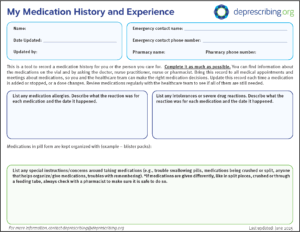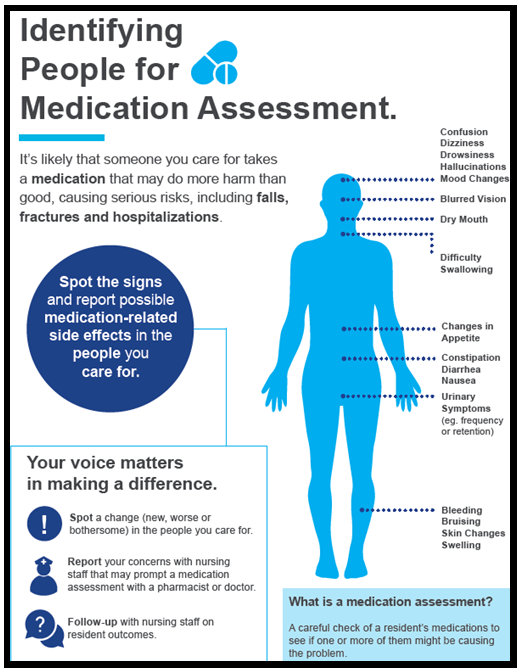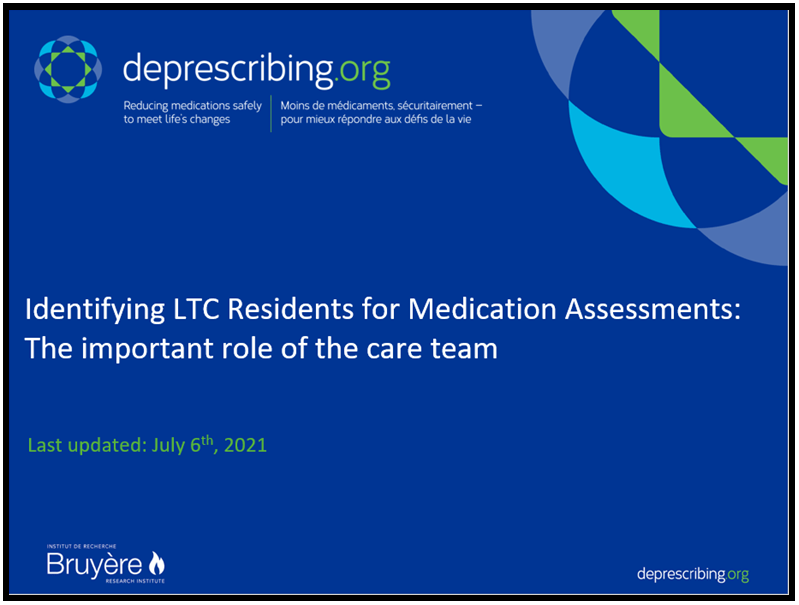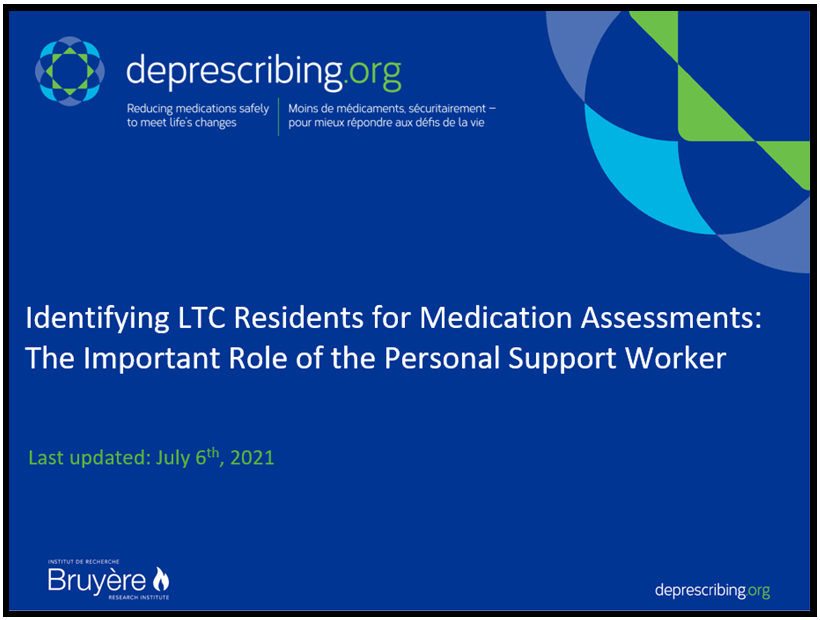Older adults living in long-term care (LTC) homes often take many medications each day – sometimes, this is not necessary and can even be harmful. Decisions about the best medications for residents are best made when people work together with their healthcare providers. Everyone within an LTC resident’s care team can help make medication-related care safe and effective.
Working with stakeholders from across Ontario’s LTC sector, our team has identified four behaviours that help deprescribing – reducing doses or stopping medications – to become a part of the culture of care.
Our stakeholders helped us create resources that can be used to help people living in LTC homes, their families, caregivers, and healthcare providers adopt these behaviours. If you are a person living in LTC or are involved in the care of someone who is living in LTC, you can download these tools and resources and put them to use.
For more information about how we identified these behaviours, click here or see our related publications.
Farrell B, Rousse-Grossman J, Santamaria C, McCarthy LM. Applying the Behaviour Change Wheel to support deprescribing in long-term care: Qualitative interviews with stakeholder participants. Exploratory Research in Clinical and Social Pharmacy, Volume 9 (March 2023) https://doi.org/10.1016/j.rcsop.2023.100256
McCarthy L, Farrell B, Howell P, Quast T. Supporting deprescribing in long-term care: An approach using stakeholder engagement, behavioural science and implementation planning. Exploratory Research in Clinical and Social Pharmacy, Volume 7 (August 2022)
https://doi.org/10.1016/j.rcsop.2022.100168
Four Target Behaviours to Promote a Culture of Deprescribing
Shared Decision-Making in Medication Management: A Guide for Long-Term Care
This guide outlines the process that can be used when making choices about medications. It is designed to be used by people living in LTC homes, their families, caregivers, and healthcare providers so that everyone works together to make decisions.
Shared Decision-Making in Medication Management Infographic
This Shared Decision-Making in Medication Management Infographic summarizes the key steps from the guide in poster/handout format to serve as a visual reminder for everyone on the resident’s care team. It encourages residents and their families to take part in conversations about medications and reminds healthcare providers and staff about the steps in the guide.
Shared Decision-Making in Medication Management Cue Card
The Shared Decision-Making in Medication Management Cue Card contains prompting questions to help residents and care partners start a conversation about their medications with the LTC healthcare team. It outlines the key concepts from the guide and can be used to help remember the steps for participating in shared decision-making about medications. Printed copies can be shared with residents, care partners, Residents’ Councils and Family Councils. Council members can also help promote and share this tool.
Fillable Medication Record and Experience Form
The Fillable Medication Record and Experience Form helps residents and their families share details about their medication history and experience. This form can be provided to residents and their families as people are moving into LTC so they can fill it out and provide the care team with as much information as possible. Having an up-to-date list of medications can help residents and their care team use shared decision-making to make choices about their medications.
Statement for Admissions and Care Conferences Checklists
The proposed Statement for Admissions and Care Conferences Checklists is a way for LTC homes to encourage residents and their families to prepare for, and engage in, conversations about their medications upon admission to the home and during care conferences. This statement is an example of text that can be included in a LTC home’s admission and care conference checklists.
Getting Involved in Medication Decisions
This resource explains the ways LTC team members are involved with medications to help residents, families, and caregivers know who to reach out to if they have any questions. The tool was requested by families who attended our Talking About Medications workshops. It was developed in partnership with our LTC Stakeholder Advisory Group and critically reviewed by LTC caregivers (Robert Patzer and Connie Newman).
2) All healthcare providers and personnel will observe for signs and symptoms in the people they care for, reporting changes as a result of medication adjustments, or changes that might prompt review for deprescribing.
Identifying People for Medication Assessment – A Guide for Long-Term Care
The Identifying People for Medication Assessment – A Guide for Long-Term Care is an instructive document that can be with all staff, including personal support workers (PSWs) who are directly involved in a resident’s care. The guide provides information that can help PSWs and other LTC staff identify signs and symptoms in a resident that may be related to medications. The guide then outlines a process that PSWs and other LTC staff can follow to ‘flag’ these concerns to other members of the care team, which may then prompt a medication assessment.
Identifying People for Medication Assessment infographic
The Identifying People for Medication Assessment infographic summarizes key steps from the guide in poster/handout format. It can be posted in LTC homes to help those that interact with residents on a regular basis, such as PSWs or family members, recognize when a medication may be causing a problem. The infographic also outlines the steps to follow to report any changes they see in a resident’s condition.
Identifying People for Medication Assessment PowerPoint Presentation
The Identifying People for Medication Assessment PowerPoint Presentation is a 30-minute interactive presentation for LTC staff. It can be incorporated by huddle leaders into huddles to support an education session about people who might benefit from medication assessment and generate discussion about how staff, particularly PSWs, can be involved.
3) Prescribers in every healthcare setting will document reasons for use, goals and timelines for each medication.
Check back later for resources designed to support this behaviour.
4) All members of the healthcare team will participate in conversations about deprescribing.
Check back later for resources designed to support this behaviour.
If you would like to share your thoughts about any of the resources provided on this web page, please send us an email at deprescribing@deprescribing.org
How were the behaviours identified and how were these resources and tools developed?
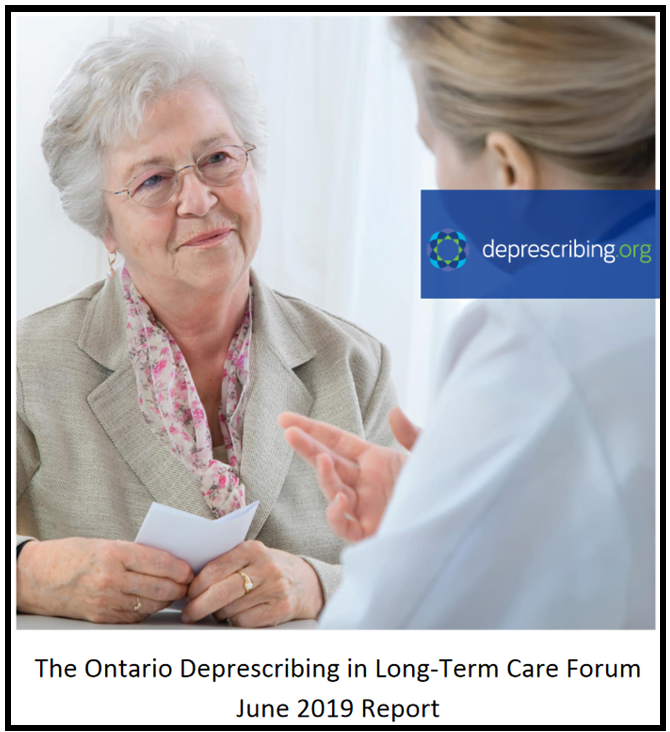 To support people in having discussions about when to continue, reduce, or stop a medication, our team has partnered with the Ontario Centres for Learning, Research and Innovation in Long-Term Care (Ontario CLRI) at Bruyère and LTC stakeholders from across Ontario. Our team hosted two Stakeholder Forums in 2019 and 2020 to develop a framework that would facilitate regular deprescribing practices within Ontario’s LTC homes.
To support people in having discussions about when to continue, reduce, or stop a medication, our team has partnered with the Ontario Centres for Learning, Research and Innovation in Long-Term Care (Ontario CLRI) at Bruyère and LTC stakeholders from across Ontario. Our team hosted two Stakeholder Forums in 2019 and 2020 to develop a framework that would facilitate regular deprescribing practices within Ontario’s LTC homes.
During these forums, stakeholders identified behaviours that would help people integrate deprescribing into daily living in LTC, as well as actions that would support these behaviours. Click here to access the Ontario Deprescribing in Long-Term Care Forum Report to read more about the history of this partnership, as well as how these behaviours and actions were identified. Since August 2019, our stakeholders have worked with us to develop resources that would help people within the LTC setting cultivate these behaviours.
Publications:
Farrell B, Rousse-Grossman J, Santamaria C, McCarthy LM. Applying the Behaviour Change Wheel to support deprescribing in long-term care: Qualitative interviews with stakeholder participants. Exploratory Research in Clinical and Social Pharmacy, Volume 9 (March 2023) https://doi.org/10.1016/j.rcsop.2023.100256
McCarthy L, Farrell B, Howell P, Quast T. Supporting deprescribing in long-term care: An approach using stakeholder engagement, behavioural science and implementation planning. Exploratory Research in Clinical and Social Pharmacy, Volume 7 (August 2022)
https://doi.org/10.1016/j.rcsop.2022.100168
Thompson W, McCarthy LM, Galley E, Homan L, Farrell B. Using shared decision-making resources in long-term care: a qualitative study. Can Geriatrics J 2023; in press.

